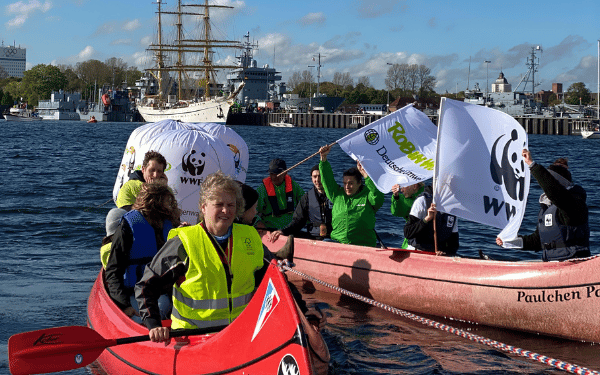It was supposed to be a grand homecoming of one of Germany’s most prized icons. The revered naval training ship Gorch Fock cruised into the Baltic Sea port of Kiel on October 4, greeted by a 20-gun salute, the Marine Music Corps, and cheering families and military buffs. After a six-year-long renovation, the three-masted tall ship once again was ready for service.
Helming the Gorch Fock for one of the last times in his career, Captain Nils Brandt wasn’t expecting the small flotilla of protesters who greeted the 266-foot “White Lady” with anything but reverence. Life-jacketed activists in canoes and inflatable boats carried signs with slogans such as “Stolen wood? Illegal is not irrelevant!” (Raubholz? Illegal ist nicht egal!).
The protest was organized by a coalition of environmental groups working to expose illegal timber practices in Germany and around the world: WWF Germany, Robin Wood, Environmental Action Germany (Deutsche Umwelthilfe), Save the Rainforest (Rettet den Regenwald) and the Forest Stewardship Council.
A WWF investigation found evidence that the 300 cubic meters of teak used to restore the Gorch Fock’s deck was illegally obtained from Myanmar, potentially in violation of EU timber trade rules. WWF obtained records from Germany’s Federal Agency for Agriculture and Food (BLE) showing that the teak was sold by a suspected Myanmar mafia boss – complete with his address. Customs declaration numbers were changed several times, WWF says, potentially to avoid export taxes. And the declared value of the timber was significantly lower than market prices.
“It is crystal-clearly documented that the wood was predominantly purchased from suspected criminals, and originates from valuable natural forests,” said WWF forest policy expert Johannes Zahnen. “The pride of the German Navy is being restored with mafia wood and the BLE turns a blind eye.”
“While we in Germany are debating better environmental and climate protection, the last primeval forests are being cut down with the support of [BLE] and the German armed forces,” Zahnen said. “Climate collapse and species loss are thus further fueled.”
WWF says such imports violate European regulations, and that BLE persistently has refused to test the teak to find out once and for all whether it was illegally imported. To force the action, WWF Germany and the German Nature Conservation Ring are taking the Gorch Fock case to Germany’s Federal Constitutional Court.
WWF also has filed a formal complaint with the European Commission for what the group calls Germany’s poor implementation and weak enforcement of EU timber rules. Only about 1 percent of German timber companies are inspected annually, according to WWF, and violations – if punished at all – are less than 1,000 euros.
In another bust, WWF forensically tested wood sold by the German mattress chain Dänisches Bettenlager and found false declarations of wood species and origin. The BLE, however, only issued warnings against the chain, which is owned by Danish multinational Jysk.
“Research…repeatedly shows that illegal timber is entering the market,” said WWF’s Philipp Wagnitz. “So far, reports and tips either have not been followed up at all or have been completely ignored. The BLE has gone quiet instead of fighting the timber mafia.”
